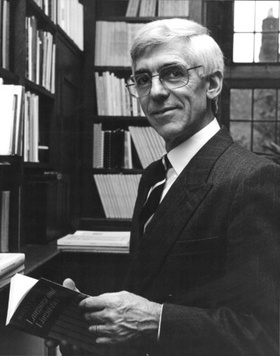John Lyons (linguist) facts for kids
Quick facts for kids
John Lyons
|
|
|---|---|
 |
|
| Born | 23 May 1932 Stretford, Lancashire, England
|
| Died | 12 March 2020 (aged 87) |
| Nationality | British |
| Alma mater | Christ's College, Cambridge |
| Scientific career | |
| Institutions | SOAS Indiana University University of Edinburgh University of Sussex University of Cambridge |
| Thesis | A structural theory of semantics and its application to some lexical subsystems in the vocabulary of Plato (1960) |
Sir John Lyons (born May 23, 1932 – died March 12, 2020) was an important British linguist. A linguist is someone who studies language. Sir John Lyons was especially known for his work on semantics, which is the study of meaning in language.
Contents
Early Life and Education
John Lyons was born and grew up in Stretford, a town in England. He went to St Ann's RC School first. Later, he won a special scholarship to attend St Bede's College, Manchester in 1943.
In 1950, John Lyons went to Christ's College, Cambridge, a famous university. There, he studied Classics (ancient Greek and Roman studies) and also earned a diploma in education.
Career Highlights
After finishing his studies, John Lyons served two years in the navy. He studied Russian and worked as a coder. After his time in the navy, he returned to Cambridge in 1956 to work on his PhD.
In 1957, he became a lecturer at the School of Oriental and African Studies (SOAS) in London. He also had a chance to study at Yale University in the United States, but he chose to stay in Britain for a rare academic job in linguistics.
Working on Machine Translation
In 1960, John Lyons traveled to Indiana University in the United States. He worked on a project about machine translation. This project aimed to teach computers to translate languages. He was chosen because he knew a lot about Russian and linguistics. While at Indiana, he also taught courses on general linguistics.
Teaching and Editing
In 1961, he went back to Christ's College, Cambridge, where he taught until 1964. From 1965 to 1969, he was the first editor of the Journal of Linguistics. This is an important journal where linguists share their research.
From 1964 to 1984, he was a professor of linguistics at the University of Edinburgh and the University of Sussex. He later became the head of Trinity Hall, Cambridge for 15 years, retiring in 2000.
Books and Bongo-Bongo
John Lyons wrote several important books that helped people understand linguistics. Some of his well-known books include Introduction to Theoretical Linguistics and Semantics.
He also created a constructed language called Bongo-Bongo. He made this language as a fun and helpful tool to teach his students about linguistics.
Honours and Recognition
John Lyons received many awards for his work.
- In 1987, he was made a knight by the Queen. This is why he is called "Sir John Lyons." He received this honour for his great contributions to the study of linguistics.
- In 2016, he was given the Neil and Saras Smith Medal for Linguistics by the British Academy. This award recognized his amazing lifetime work in linguistics.
Selected Works
Here are some of the important books Sir John Lyons wrote or helped to edit:
- Structural Semantics (1963)
- Introduction to Theoretical Linguistics (1968)
- Noam Chomsky (1970)
- New Horizons in Linguistics (1970) (as editor)
- Semantics (1977)
- Language and Linguistics (1981)
- Language, Meaning and Context (1981)
- New Horizons in Linguistics 2 (1987) (as co-editor)
- Natural Language and Universal Grammar (1991)
- Linguistic Semantics: An introduction (1995)
See also
- Bongo-Bongo
- In Spanish: John Lyons para niños
 | Delilah Pierce |
 | Gordon Parks |
 | Augusta Savage |
 | Charles Ethan Porter |

